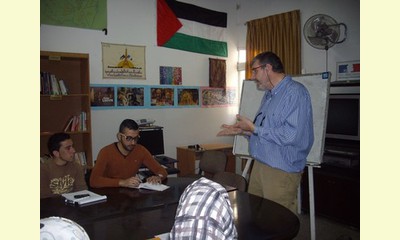|
|
Palestine: Le Centre de la paix organise une rencontre sur la liberté d'expression
an article by Ziad Medoukh
Le jeudi 24 avril 2014, dans ses locaux, le Centre
de la paix de l’université Al-Aqsa de Gaza, a
organisé une rencontre très intéressante sur la
liberté d’expression qui a été animé par Monsieur
Philippe Agret, directeur du bureau de l’AFP-
Agence France - Presse dans les territoires
palestiniens.

click on photo to enlarge
Monsieur Ziad Medoukh, coordinateur du Centre de
la paix, a inauguré cette rencontre par quelques
mots de présentation. Il a spécifié qu’elle
entrait dans le cadre de la politique du Centre,
qui est d’organiser des rencontres pour les jeunes
de Gaza. Il a insisté sur l’importance de cette
activité. Son objectif est de leur donner
l’occasion de s’exprimer et parler en toute
liberté de leur environnement, de leurs problèmes
sociaux et de parler en toute liberté, de leur
vie, de leur environnement, de leurs problèmes, de
leur façon de voir les choses et de les analyser.
Au début, Monsieur Agret a parlé du travail
journalistique des médias francophones en
Palestine. Puis, il a présenté son Agence,
expliquant comment elle fut créée et comment elle
fonctionne en Cisjordanie et dans la bande de
Gaza. Il a jouté que le bureau de l’AFP à Gaza
était le premier ouvert dans les années 90 et
restait, malgré toutes les difficultés sur place.
Pendant plus d’une heure, l’intervenant a évoqué
plusieurs thèmes liés au programme de cette
rencontre, tel que l’expression des opinions
politiques et personnelle, ainsi que de la façon
dont la loi assure et protège cette liberté
d’expression.
Il a beaucoup échangé avec les 22 étudiants
présents, sur les différents aspects de ce thème
polémique dans notre société.
Cette nouvelle activité organisée dans notre Centre
pour la paix, témoigne de l’importance de travailler
et de dialoguer avec les jeunes de la bande de Gaza.
A la fin, il a été décidé d’organiser un atelier
d’écriture journalistique organisé par l’équipe de
l’AFP en Palestine pour les étudiants du département
de français.
( Cliquez ici pour une version anglaise)
|








|
DISCUSSION
Question(s) related to this article:
Free flow of information, How is it important for a culture of peace?
* * * * *
Latest reader comment:
Perhaps the simplest way to illustrate the essential importance of free flow of information for a culture of peace is to discuss the importance of the control of information for the culture of war.
Here are excerpts from an Washington Post investigation two years ago entitled Top Secret America: A hidden world, growing beyond control. To read the original, click here.
"* Some 1,271 government organizations and 1,931 private companies work on programs related to counterterrorism, homeland security and intelligence in about 10,000 locations across the United States.
* An estimated 854,000 people, nearly 1.5 times as many people as live in Washington, D.C., hold top-secret security clearances.
* In Washington and the surrounding area, 33 building complexes for top-secret intelligence work are under construction or have been built since September 2001. Together they occupy the equivalent of almost three Pentagons or 22 U.S. Capitol buildings - about 17 million square feet of space.
* Many security and intelligence agencies do the same work, creating redundancy and waste. For example, 51 federal organizations and military commands, operating in 15 U.S. cities, track the flow of money to and from terrorist networks.
* Analysts who make sense of documents and conversations obtained by foreign and domestic spying share their judgment by publishing 50,000 intelligence reports each year - a volume so large that many are routinely ignored." . . .
"Every day across the United States, 854,000 civil servants, military personnel and private contractors with top-secret security clearances are scanned into offices protected by electromagnetic locks, retinal cameras and fortified walls that eavesdropping equipment cannot penetrate. . .
Much of the information about this mission is classified. That is the reason it is so difficult to gauge the success and identify the problems of Top Secret America, including whether money is being spent wisely. The U.S. intelligence budget is vast, publicly announced last year as $75 billion, 21/2 times the size it was on Sept. 10, 2001. But the figure doesn't include many military activities or domestic counterterrorism programs."
As we said in the draft Declaration and Programme of Action on a Culture of Peace that we sent from UNESCO to the UN General Assembly in 1998:
"98. It is vital to promote transparency in governance and economic decision-making and to look into the proliferation of secrecy justified in terms of 'national security', 'financial security', and 'economic competitiveness'. The question is to what extent this secrecy is compatible with the access to information necessary for democratic practice and social justice and whether, in some cases, instead of contributing to long-term security, it may conceal information about processes (ecological, financial, military, etc.) which are a potential threat to everyone and which need therefore to be addressed collectively."

|
|









